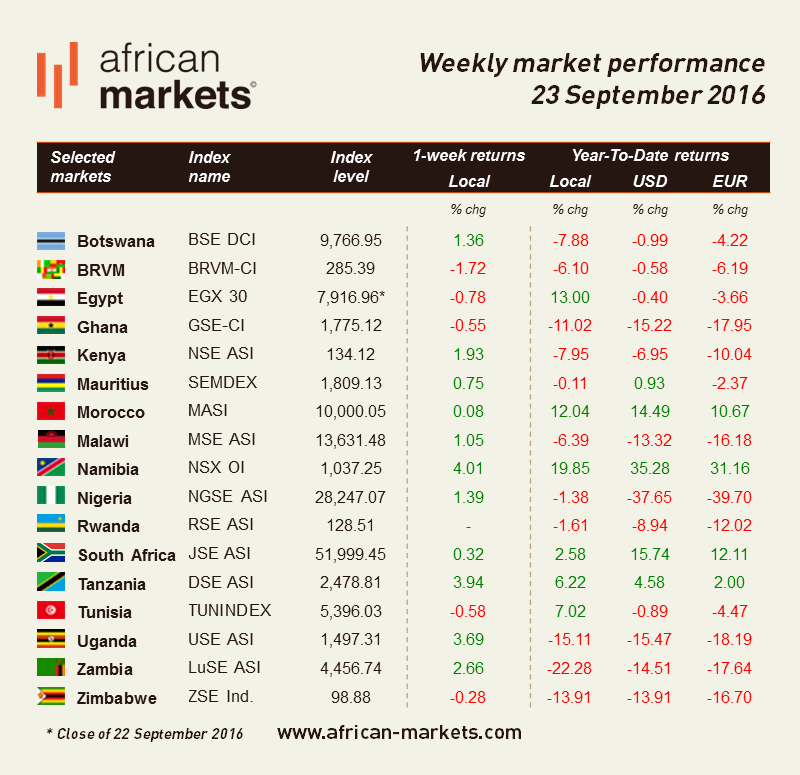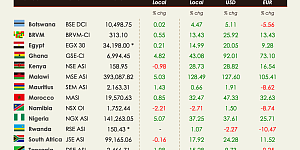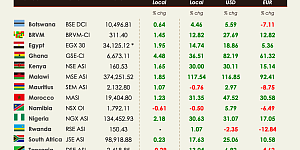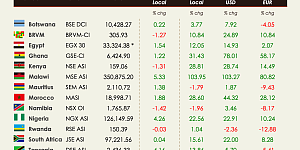One of the main jobs of a Central Bank is price stability, this translated into different actions this weeks in many of the countries under coverage.
Abdul Nashiru Issahaku, Bank of Ghana governor, is working on the review of minimum capital requirements with a committee whose recommendations are to be published by the end of the year. The Governor has been vocal recently on the need for Ghanaian banks to reach sufficient capital levels in order to help GDP to reach the target of 8% growth a year. According to the Governor, this review should trigger consolidation. In parallel, Ghana’s Central Bank held the benchmark interest rate unchanged at 26% after inflation increased to 16.9% in August from 16.7% in July above its target range of between 6 and 10% (which it has not reached for 3,5 years). The Governor expects inflation to fell within target in the second quarter of next year. GSE-CI gained 0.09%.
Dollar scarcity as a consequence of the peg removal in June is still going on in Nigeria. This has caused concerns and foreign investors are yet to come back. In other news, an investigation has been launched concerning to check if $17bn worth of oil and liquefied natural gas which ended up in the US, China and Norway had been initially stolen. The government is suing many companies for illegally exporting oil in these countries between 2011 and 2014. NGSE ASI gained 1.39%.
JSE ASI gained 0.32%. A survey has recently showed that rain prospects have improved crop conditions and yields should boost wheat production estimate by 1.2%. For the first time this year, inflation reached 5.9% in August falling below the upper end of the target. As expected by the market, the SARB left the benchmark repurchase rate at 7% for its third consecutive meeting. South Africa’s Central Bank has left the interest rate unchanged since March in an attempt to support a slowing economy suffering from weak export demand, low commodity prices and a terrible drought. In the meantime, GDP is now expected to grow by 0.4% from 0% and inflation is now expected to average 6.4% this year just above the upper end of the 3-6% inflation target band. The general consensus seems now to believe that the hiking cycle is done and that the rates will remain unchanged until the end of 2017.
The Central Bank of Kenya lowered its benchmark rate by 50 basis points to 10% this week in an attempt to support private sector credit. This represents its second cut in four months. The decision of the Central Bank happens just weeks after the government promulgated a law restricting loan costs to 400 basis points above the Central Bank rate. According to central bank statistics, growth in loans fell to a nine-year low of 7.2% year-on-year in July from 21.4% a year earlier. The challenging time for Kenya’s banking sector may last longer than anticipated. NSE ASI gained 1.93%.
EGX30 lost 0.78%. The Central Bank of Egypt kept its key interest rates unchanged during its last meeting. Consensus expected the Bank to hike interest rates following soaring inflation however the Bank described the factors behind the increase such as higher electricity bills and increased demand on food items in Eid El Adha as temporary which means raising rates would not have helped containing the inflation. A note published by the Monetary Policy Committee states that growth dynamics were not supportive of rate hikes.










































